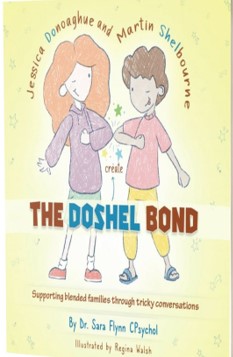The Doshel Bond – Book Review (by Marie Divilly)

SCI would like to say a big thank you to Marie Divilly, who took the time to write The Doshel Bond book review. We greatly appreciate your time and feedback.
The Doshel bond – Marie Divilly
Jessica O’Donoghue and Martin Shelbourne are half brother and sister. There is nothing half about these two though, they commit to their adventures 100%. Jessica and Martin have a special handshake that they made up from their surnames Donoghue and Shelbourne to celebrate when good stuff happens called “The Do-Shel handshake”.
Jessica has to say goodbye to her brother every other week to go and stay with her Mum. The rules are different at mum’s house and when she comes back she always has lots of big feelings that come with her. Sometimes she overhears her parents say not nice things about each other and she keeps it all inside.
Sometimes Jessica feels like she is in the story “The Princess and the pea” but she is not the princess, she is the pea with layers and layers of anger building from both her Mum and her Dad.
After one particular visit at her Mum’s house, Mum makes fun of Jessica’s brother Martin and she comes back to her Dads house feeling angry but the first person she takes her anger out on is her brother Martin and from there things get even crazier.
Later that day, feeling ashamed and upset, Jessica and her Dad have an honest conversation and Jessica tells her Dad about all of her big feelings. Dad also acknowledges that sometimes adults get it wrong too. When Martin arrives, Jessica runs to him and they do their special handshake except this time it is to say “I love you”.
This book is a child friendly honest and realistic account of contemporary blended family living and the impact that harsh words and negative comments by parents about each other can have on their children. It also shows the reader that by sharing your feelings, relationships can be healed and repaired. This book does not only appeal to children but gives a thought provoking message for any parent reading it to their child. It is equally a useful resource for Social Care practitioners and might appeal to those working with children/families. Among the pages of this well executed tale are different questions which can be asked to illicit further discussion such as “Do your feelings ever change from one feeling to another?” or “Who do you trust that you can share your feelings with?”. This newly published book is a welcome addition to any professionals therapeutic toolkit and I would highly recommend.
